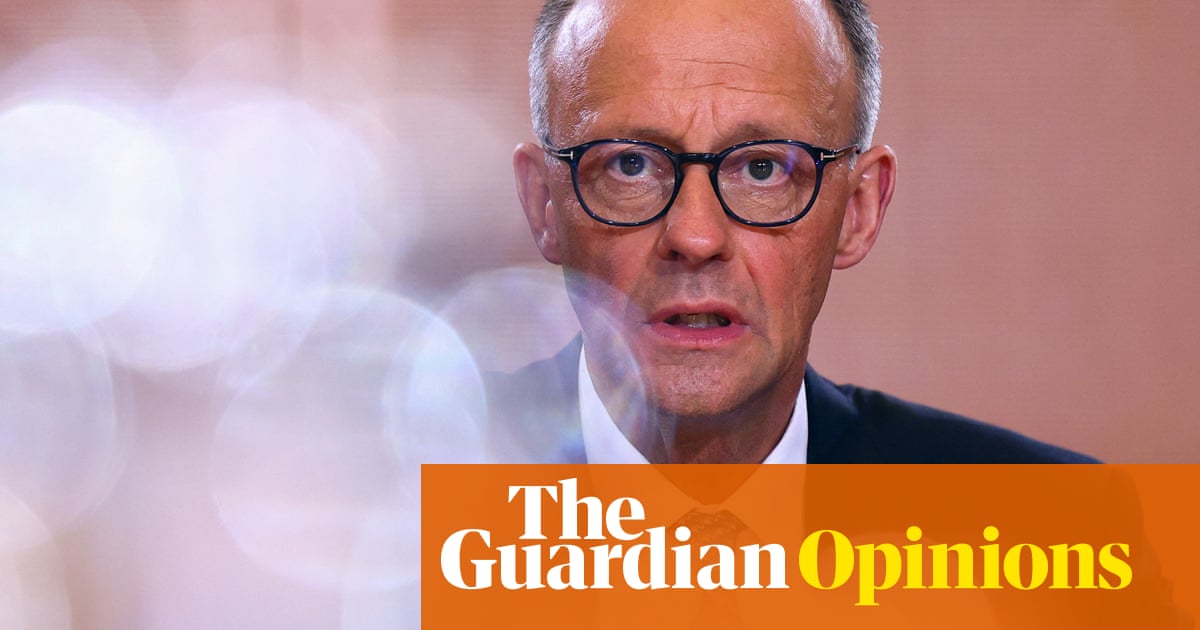There goes the cliche about German politics being stable but dull. Germany finally has a new leader, but only after a day ofdrama, suspense and historic twists. The conservative Friedrich Merz failed to secure a majority confirming him as chancellor in the first round of voting in the Bundestag. In eight decades of postwar Germany, this has never happened before.
When Merz’s cabinet was finally sworn in later on Tuesday afternoon, after a successful second round, both parties in the governing coalition – the conservative CDU/CSU and the Social Democrats (SPD) – were eager to play down the failure as a mere hiccup. But the high drama indicates a new degree of fragmentation and instability in the German party system. It is certain to affect the way this new administration will govern.
Merz starts his term as a weakened, somewhat humbled leader. There is some poetic justice in that, certainly from the viewpoint of the opposition. Ironically, Merz had to rely on the support of the Greens and the far-left Die Linke on Tuesday to table a second round of voting. Merz had fiercely attacked both parties during the campaign. But because a two-thirds majority was needed to change the Bundestag’s proceedings to allow a second vote on the same day, the conservatives had to beg the loony left (or “leftwing weirdos” as Merz calls them) for help.
Technically, they could also have relied on votes by the hard-right AfD, now the leading opposition party. But that move would have blown up the new coalition. Its governing consensus is based on maintaining the “firewall” against the AfD, excluding cooperation with the party that was confirmed as “rightwing extremist” by the German domestic security service just days ago.
Merz had promised to take the Christian Democrats back to their roots after Angela Merkel’s decidedly moderate reign. But coalition dynamics draw him even closer to the centre than his predecessor. This, in turn, exposes him to attacks from the AfD, whose leaders constantly assail Merz for his supposed “treason” of conservative principles.
Berlin is rife with speculation about who the rebels were. Disaffected conservatives, unhappy with the abolition of the strict deficit rules, theso-called debt brake? Distrustful Social Democrats holding Merz in contempt forpushing a migration billthrough the Bundestag earlier this year with help from the AfD?
Maybe both? Because of the secret ballot, Merz and his vice-chancellor,Lars Klingbeil, the co-leader of the SPD, cannot be sure what triggered the extraordinary vote of no confidence by the 18 dissidents who denied them a smooth confirmation. Yes, they succeeded in re-establishing discipline before the second vote. But the brush with disaster will be remembered whenever contentious legislation comes to a vote in the next four years.
It is also all but certain that Germany’s challenges will demand painful compromises from both coalition partners. The conservatives must accept a looser fiscal policy so the country can finally invest heavily in defence and replace crumbling infrastructure, while the centre-left will find it hard to take ownership of theharsher stanceon irregular immigration that a majority of voters want.
The challenges that this new German government faces are enormous. Germany’s business model is under assault from China and the US at the same time, with Donald Trump’s tariffs looming and a flood ofChinese EVsthreatening to wipe out the German car industry. Not to mention America’s desire to wash its hands of Ukraine and leave the security of the continent to the Europeans.
However, not everything is gloomy. Merz, for all his strategic mishaps, has the right instincts about Germany’s European destiny. The lifelong Atlanticist spent some of his happiest professional years working for the American investment company BlackRock. He has a genuine affection for the US, yet he is remarkably sober about the dire future of the transatlantic relationship. In hisfirst television interviewas chancellor, he told the Trump administration to “leave German domestic politics alone”. After all the meddling by JD Vance, Elon Musk and Marco Rubio in favour of the German hard right, that was a welcome tone of polite defiance.
Interestingly, Merz seems to view the US reversal on European security and free trade as a tragic mistake, but also as an opportunity. He wants to work closely with the UK, Poland, France and others to putEuropeon a path to more independence and self-reliance.
This calls for robust leadership in Berlin. The new German chancellor will need a stable governing majority to be a credible “servant leader” in Europe. To be taken seriously abroad, Merz must change his leadership style at home.
The early near-death experience of the new coalition might yet be helpful in reminding everybody what is at stake.
Jörg Lau is an international correspondent for the German weekly Die Zeit
